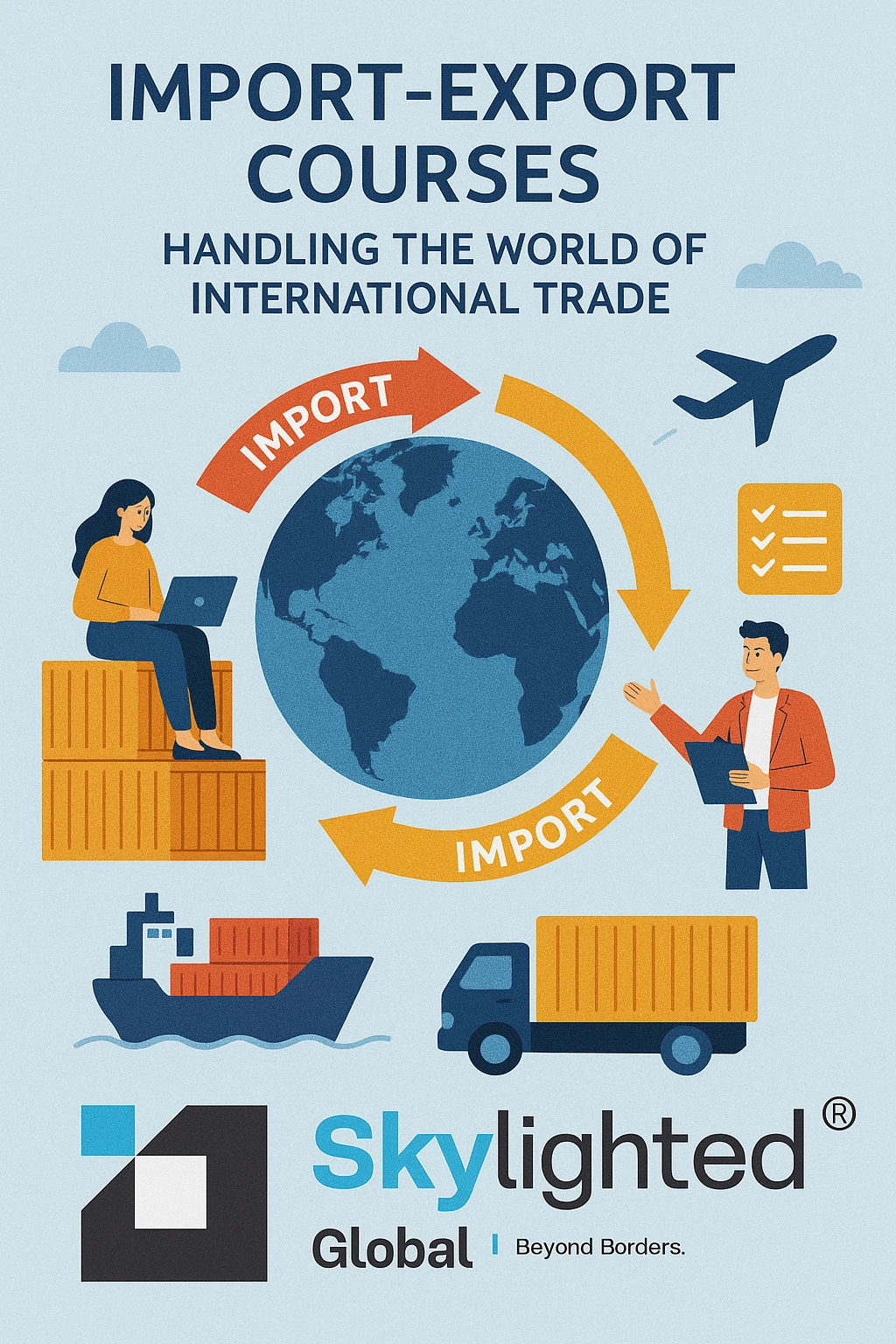Overview:
It is impossible to overestimate the significance of comprehending international trade in the connected world of today, where borders are more symbolic than real. Professionals who understand the complexities of import and export are in high demand since the smooth movement of goods and services is essential to the global economy. The importance of import-export courses is examined in this article, which also looks at the kinds of courses that are offered, the reasons why one should think about taking them, and how they affect career paths.
Why Select Courses on Import-Export?
There are a lot of opportunities when you start looking into import-export courses. Beyond personal development, the benefits include industry relevance and career advancements. Professionals in a variety of industries find that having knowledge of import-export is a great advantage due to the growing complexity of international trade laws.
Knowing the Fundamentals of International Trade
Understanding the foundations of international trade is essential before diving into the details of import-export courses. The foundation for a thorough grasp of the topic is laid in this part, which introduces readers to the importance of international trade. Examining fundamental ideas and terminology gives those starting out in the import-export market a strong starting point.
Import-Export Course Types
There are many different types of import-export education, ranging from university-level academic courses to hands-on training sessions led by professionals in the field. In addition to highlighting specialist courses designed for various industries, this section makes a distinction between theoretical and practical approaches. The variety of course options guarantees that people can select a course that fits with their professional objectives.
Advantages of Tailored Instruction
Although having a general understanding of import-export is beneficial, specialist training focuses on knowledge and abilities unique to the business. Specialized courses provide a deeper dive into the real-world implementation of import-export principles, whether it’s negotiating the complexities of the pharmaceutical trade or comprehending the subtleties of agricultural exports.
Top Skills Taught in Courses on Import-Export
Professionals in import-export need a wide range of skills. This section lists the essential skills taught in respectable import-export courses, ranging from perfecting the art of documentation and compliance to developing negotiation and communication abilities. These abilities not only help professionals perform their jobs more effectively, but they also improve the general effectiveness of international trade.
Comparing Online and Offline Courses
The argument between online and offline learning is a constant in the digital age. This section examines the benefits and drawbacks of both strategies, taking into account elements like adaptability, engagement, and the usefulness of conventional classroom environments. Professionals in import-export can select the format that best suits their lifestyle and preferred method of learning.
Success Stories: Import-Export Courses’ Effect
Success tales from real life give the piece a more intimate feel. Readers are given insight into the observable results of import-export education by showcasing individuals who have profited from such courses. For anyone thinking about taking a similar route, testimonials and professional successes provide motivation.
Selecting the Appropriate Import-Export Program
A person’s career may be significantly impacted by their choice of import-export course. This section highlights the significance of certification and industry recognition while offering insights into the elements to take into account while making this decision. The value of the education obtained can be greatly impacted by a carefully selected course.
Problems and Fixes
Importing and exporting has its share of difficulties, just like any other career. This section lists typical obstacles encountered by industry professionals and examines how specific training prepares them to handle these obstacles. Import-export courses offer useful answers for handling logistical problems and managing complicated rules.
Trends and Opportunities in International Trade
The import-export market is dynamic and subject to changes in the economy and worldwide trends. This segment examines contemporary patterns in global commerce and pinpoints prospects for experts to profit from developing markets. Success in the field depends on keeping up with the always shifting landscape.
Technology’s Place in Import-Export Programs
Modern education is significantly shaped by technology, and import-export courses are no different. This section examines how training programs incorporate technology, providing creative answers to age-old trade problems. Technology improves import-export operations’ efficiency, from blockchain-based supply chain management to digital documentation systems.
Building Communities and Networks
As with any industry, establishing a professional network is crucial in the import-export sector. The significance of networking is covered in this section, along with how import-export courses help people make worthwhile relationships. Networking helps experts in the area continue to grow, whether through industry gatherings or online platforms.Prospects for Import-Export Courses in the Future
Import-export education is a field that changes along with international trade. This section highlights the value of lifelong learning and offers insights into new developments in global trade education. To be competitive in the always changing market, professionals are urged to keep up with developments in the field.
In conclusion
In conclusion, for those with the necessary information and abilities, the import-export industry presents a plethora of chances. An effective and rewarding profession in international trade can be accessed through import-export courses. The knowledge acquired from these courses equips professionals to succeed in the ever-changing world of international trade, whether it be by negotiating intricate rules or spotting profitable markets.


